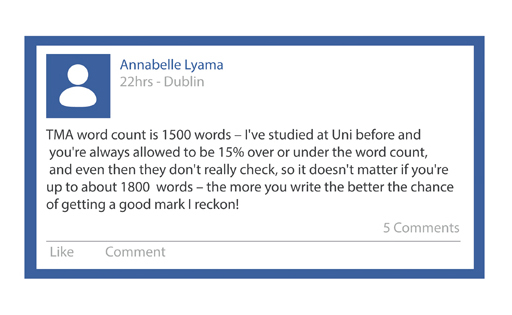5.1 Social media
You have plenty of opportunities to engage with your fellow students and keep up with OU news and events on social media while you study at the OU, but only if you want to. By social media we mean public sites and services outside of the OU websites and forums, such as Facebook and X (previously known as Twitter).
Using social media is not compulsory so don’t feel you need to sign up for or use a social media account if you don’t want to. All important communications from the OU are sent via email, on StudentHome or on your module website, so you won’t miss these if you choose not to use it.
The following social media accounts are official ones run by OU staff:
- Facebook: The OU [Tip: hold Ctrl and click a link to open it in a new tab. (Hide tip)]
- X: @OpenUniversity
- LinkedIn: The Open University
- Instagram: theopenuniversity
The OU Students Association are also active on social media:
- X: @OUstudents
- Facebook: OU Students Association
Also check out the OU Library:
- Facebook: The Open University Library
- X: @OULibrary
For Careers and Employability Services:
And OpenLearn:
- X: @OuFreeLearning
- Facebook: OpenLearn
You may also find your subject area or faculty have their own official social media accounts.
Many students also set up their own social media groups – you’ll probably find that one gets set up for each module you study. These can be a great place to get to know other students, share ideas and support one another.
However, you need to remember that these groups are not moderated by OU staff and this means there are various risks associated with them. The next activity considers these risks.
Activity 4 Information on social media
Imagine that you have started studying your first module and your first tutor-marked assignment (the OU calls this a TMA) is due soon. You’ve joined a Facebook group set up by another student in your tutor group and go on it to have a look at what other students are saying about the TMA. Another student has posted the following message in the group:
What would you do as a result of reading this information?
Make some notes here.
Discussion
This student would have meant well but unfortunately the information is not correct. You can’t assume that all universities follow the same rules for things like word counts. What the student said could have been right but you’d need to check the assignment guidance or with your tutor to be sure.
The important point to remember is that you should always look at official OU sources for important information like this, rather than trusting the word of your fellow students, however well intended. This is one reason why the tutor group forums and other OU forum spaces (explored in Session 4) are so useful – they allow you to chat with your fellow students but your tutor or another member of staff is always keeping an eye on what’s being said and can correct anything that might send you down the wrong track.
You might want to use social media spaces to socialise, but try and keep chat about assignments and understanding study topics in the tutor group forum. In unmoderated social media spaces there’s no one to reliably correct misinformation so it can spread quickly.
It’s easy to read something online and take it as fact. The activity you’ve just done relates to an important digital skill you’ll need to develop as a student – assessing the reliability of information. There’s a lot of information out there online and you need to be mindful that anyone can publish material so not everything is true. As a student you’ll learn to question the reliability and motivations behind materials you come across.
There are also other risks associated with using unmoderated social media spaces, such as risks to your privacy and potential for bullying and harassment. There are measures you can take to protect yourself, and digital skills resources can help you do this. You’ll look at these in Session 6. The OU also has a policy for students using social media.
Although you do need to be mindful of the risks, using social media can also enhance your learning. So, let’s look at this more positive side in the next brief section.

